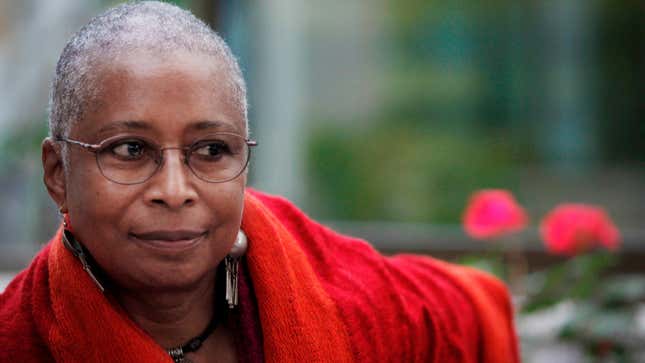
It is no understatement to say that Alice Walker’s The Color Purple is part of the American canon—and, thanks in large part to the 1985 film that followed the novel’s 1982 release, a highly quotable African-American classic.
However, it is equally true that this American classic, like many others, was one mired in early controversy; specifically for how its author had rendered her Black male characters. This, despite the fact that all of The Color Purple’s characters were based on members of Walker’s own extended family (a fact brought to new light by the author herself in Salamishah Tillet’s In Search of the Color Purple).
“It’s not a pleasant feeling to be attacked for expressing the truth of your life, basically,” the Pulitzer Prize-winning author further explained during an exclusive interview with Amna Khalid for the new podcast Banished (produced by Booksmart Studios, which provided excerpts of the interview transcript to The Root). “This is how I, at the time, wanted to share what I understood of reality. And it was actually surprising and in some ways shocking that people were so afraid of it.
“I was surprised that people didn’t understand the compassion I feel for Black men,” she later added. “It was so interesting, but then I realized that they didn’t read the books. And that helped. I said, ‘Oh, they didn’t read them.’ And I think that’s true and it’s unfortunate.”
While it’s true that reading comprehension often feels like it’s been on a steady decline during the nearly 40 years since, Walker’s become no stranger to controversy—or cancel culture—in that same time. As recently as 2018, the author-activist, who has long been staunch in her advocacy for Palestine, came under fire for her New York Times-published endorsement of David Icke’s And the Truth Shall Set You Free, a book widely considered anti-Semitic by an author widely considered to be the same, as well as a conspiracy theorist.
Walker, whose work as an activist, novelist and poet is widely beloved and referenced, recommended David Icke’s And the Truth Shall Set You Free in the Times’ “By the Book” series.
It should be noted that this isn’t the first time Walker—whose Pulitzer Prize-winning novel, The Color Purple, is considered a cultural touchstone—has been accused of anti-Semitism. The most galling example may be a 2017 poem entitled “It Is Our (Frightful) Duty,” which begins as a defense of Palestine (and, ironically, against accusations that she’s an anti-Semite) but quickly devolves into a tangled, messy takedown of the Talmud, a Jewish religious text.
“I do not believe [Icke] is anti-Semitic or anti-Jewish. I do believe he is brave enough to ask the questions others fear to ask, and to speak his own understanding of the truth wherever it might lead,” Walker said at the time (h/t Vox). “Many attempts have been made to censor and silence him. As a woman, and a person of color, as a writer who has been criticized and banned myself, I support his right to share his own thoughts.”
She doubles down on the rebuttal in her Banished interview, just months after those allegations caused her invitation to deliver the commencement speech at New York’s Hudson Valley Community College to be rescinded due to anonymous complaints.
“I was accused of being anti-Semitic myself, which is such an old trope. I mean, it’s just ridiculous,” Walker tells Khalid, adding: “I don’t really spend a whole lot of time agonizing over any of this because people do have a right to their perceptions, but they twist things so that the world that we would like to have where people are feeling free and equal, that’s not likely to happen with all of the canceling, all the cancellations.”
Unsurprisingly, given her activist history and consistent centering of Black identity in her work, Walker also offers an astute framing of cancel culture in the context of anti-Blackness, noting: “We [Black people] have always been used as a scapegoat. We’ve always been used as the focus so that you don’t notice all the other horrible things that are happening to you. You can always just say, ‘Oh, those poor Black people’ or ‘all those terrible Black people,’ something about the Black people, and very often about the Black men, which is why the criticism that I was somehow hostile to Black men was just absurd,” she continued, adding: “But it’s useful to the people who want to divide us. Very useful. It was a way to actually divide Black men and Black women and it was a way to distract all the rest of the people on the planet from their disasters.”
Her tactics may remain curious, but ever the sage, Walker warns that our glee for cancelling folks is concerning, as well.
“If you are brought up in a racist society, a sexist society, all you can do basically is try to free yourself by any means necessary. By reading, by traveling, by listening, by thinking. That’s what you do…People can evolve,” she says. “And if you don’t give them that opportunity, all you’re setting yourself up for is that nobody will give you the opportunity in the future. And I dread thinking about what will happen to these same people further along the line.”
You can listen to the full interview with Alice Walker, in which she also shares her thoughts on the goals and economic impacts of cancel culture, on the Banished podcast.

